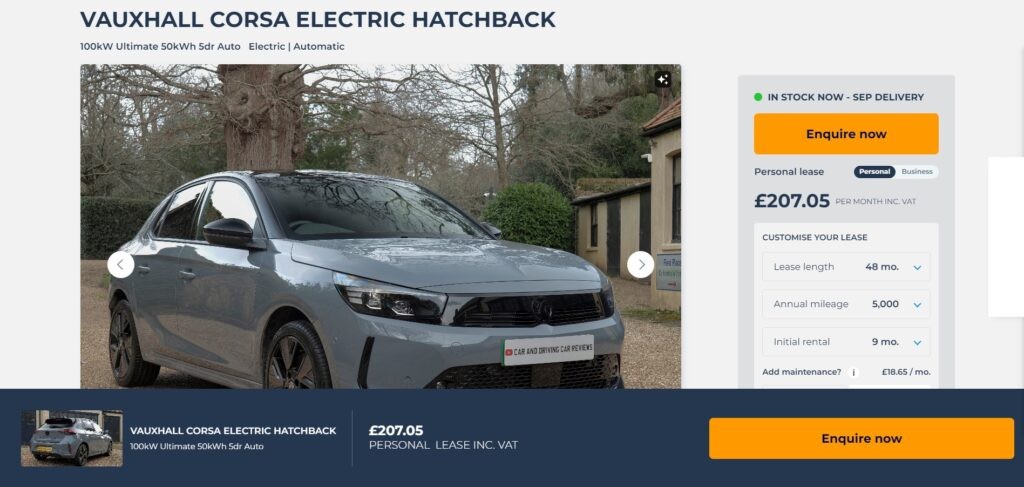
In an era where electric vehicles (EVs) are becoming increasingly popular, understanding home charging is critical. This article explores home charging for electric cars, the benefits, emphasising ease of use and cost-effectiveness, especially with products like the Hive EV charging solution from British Gas.
What is the Hive EV Charging Option from British Gas?
British Gas has an Electric Driver Tariff for electric vehicle (EV) owners, offering the lowest rates in the UK for EV charging when paired with their Hive Smart Charge system. This tariff is great for users with Hive EV chargers, letting them charge their vehicles overnight at a low rate of just 3.9p/kWh between 12 am and 5 am. Users can also get a 4p/kWh credit on their EV charging to help save more.
The Electric Driver Tariff is based on two rates, giving lower prices during off-peak times while keeping competitive rates during the day. Customers can use cheaper electricity to charge their EVs and other energy-hungry devices like washing machines and dishwashers.
To be eligible for the tariff, customers must have an EV they charge at home and an electricity smart meter, which British Gas can supply for free. This tariff is open to new and existing customers, and Direct Debit payments are made. British Gas wants to make EV charging more affordable and improve customer satisfaction, having recently been praised for better service quality.
When looking at home charging for electric cars, an alternative to the Hive from British Gas is the Octopus Intelligent Go Tarif we looked into this in a separate article you can view here.
Why Choose Home Charging?
Home charging offers unparalleled convenience and savings compared to public charging networks. While rapid chargers at public stations are fast, they can also be expensive. Therefore, it’s best to use them sparingly for urgent top-ups.
Home charging typically occurs overnight, allowing you to take advantage of off-peak energy prices and sustainable energy sources. The result? You start every day with a fully charged vehicle without the hassle of searching for charging stations.

Types of Charging Cables for Your EV
Understanding charging cables is essential for a seamless experience. Most EVs in the UK use the Type 2 charging cable for home charging, which is also compatible with the Hive’s 7.4 kW smart home charger.
The CCS (Combined Charging System) is the standard for public rapid charging, while some Japanese and Korean models utilise the CHAdeMO connector. Public chargers usually facilitate both options. Therefore, always check your vehicle’s specifications and use reliable apps to locate suitable charging points.
The Cost-Effectiveness of Home Charging
Home charging can significantly reduce your overall costs. Charging during peak times can be akin to purchasing expensive train tickets. When electricity demand surges, so do prices. Conversely, off-peak charging can lower your expenses considerably. Opting for overnight charging gives you a dual benefit: cost savings and access to renewable energy sources.
Since an electric car spends about 80% of its time parked at home, charging overnight aligns perfectly with its usage patterns. With a good tariff, home charging offers a financially savvy way to power your vehicle while contributing to sustainability.
Smart Charging Solutions
Smart chargers, like the Hive 7.4 kW model, add another layer of convenience. Similar to an electric kettle, an EV only draws power when charging. These smart devices automatically stop supplying electricity once your car is fully charged, ensuring energy is not wasted.
Moreover, smart chargers allow you to control your charging remotely via the Hive smartphone app. This feature simplifies the charging process, enabling you to check in on the status and adjust settings as needed, all from the comfort of your sofa.
Daily Journey Considerations
You might not need to charge your EV as frequently as you think. For example, a commuter may drive only 10 to 20 miles daily. Thus, an EV with a range of 240 miles could easily last a week without needing a charge. Longer journeys, such as from London to Devon, can also be completed on a single charge.
However, to maximise range and minimise charging anxiety, it is advisable to plug your EV into a smart charger each night. This ensures you start every journey at full charge and keeps your operating costs down.
Optimising Battery Life
It’s essential to understand how charging affects the life of your EV battery. Just like your smartphone, an electric car’s battery degrades over time, and the charging method plays a vital role in its longevity. EV batteries perform optimally when charged slowly. Relying on rapid chargers for regular charging can diminish battery performance over the long term.
To protect your investment, stick to slower charging at home when your vehicle is not in use. This method not only maximises the mileage but also extends battery life. Following the 80% rule—keeping the battery charged between 20% and 80%—is a wise practice for maintaining battery health.
Final Thoughts: Embrace the Future of Driving
Home charging is undoubtedly the most convenient and cost-effective solution for EV owners. With the Hive EV charging package from British Gas, you can enjoy seamless charging, saving both time and money. By optimising your charging habits, you ensure your car is always ready to go while safeguarding the environment.
As electric vehicles become more popular, understanding your charging options becomes more important. Embracing home charging, particularly with smart solutions, positions you well for a sustainable future. Start enjoying the benefits today—charge smart, drive smart.
FAQs
Q1: What are the main advantages of home charging for electric vehicles?
A1: Home charging offers unparalleled convenience and cost savings compared to public charging networks. It typically occurs overnight, allowing you to take advantage of off-peak energy prices and sustainable energy sources. This ensures your vehicle is fully charged each day without the hassle of searching for charging stations.
Q2: Which type of charging cable is mostly used for home-charging electric vehicles in the UK?
A2: Most electric vehicles in the UK utilise the Type 2 charging cable for home charging, which is compatible with the Hive’s 7.4 kW smart home charger. The CCS (Combined Charging System) is the standard for public rapid charging, while some Japanese and Korean models use the CHAdeMO connector.
Q3: How can home charging reduce my overall costs?
A3: Home charging can significantly lower your expenses by allowing you to charge during off-peak times, which are cheaper than peak rates. By charging overnight, you not only save on electricity costs but can also use renewable energy sources, thereby optimising your budget and contributing to sustainability.
Q4: What are the benefits of using a smart charger like the Hive 7.4 kW model?
A4: Smart chargers provide increased convenience. They only draw power when charging, stopping automatically once your vehicle is fully charged to prevent energy waste. Plus, they allow remote control via the Hive smartphone app, enabling you to monitor your charging status and adjust settings comfortably.
Q5: What charging practices can help optimise the battery life of my electric vehicle?
A5: To optimise battery life, it’s advisable to charge your electric vehicle slowly at home rather than relying on rapid chargers for regular charging. Following the 80% rule—keeping the battery charged between 20% and 80%—helps maintain battery health and performance over time.






